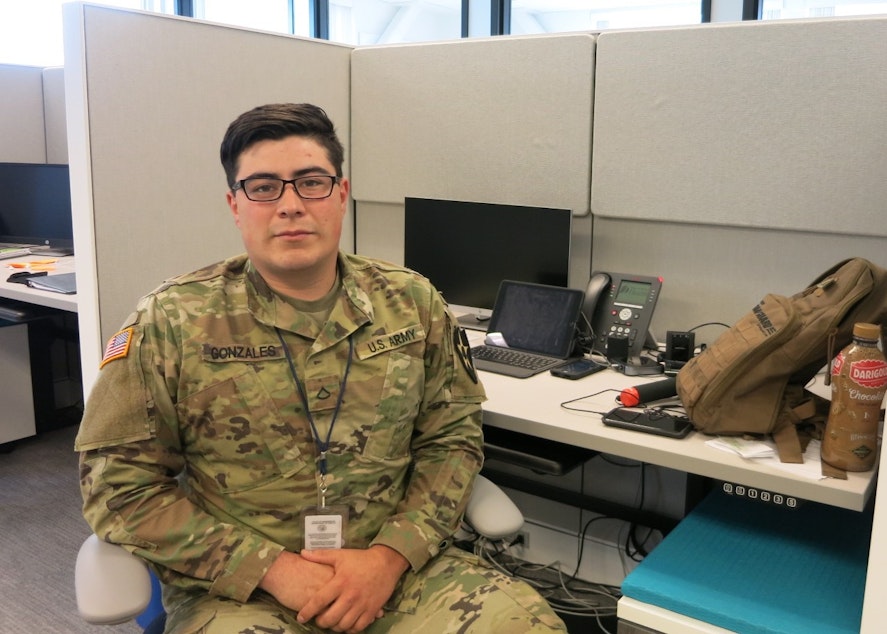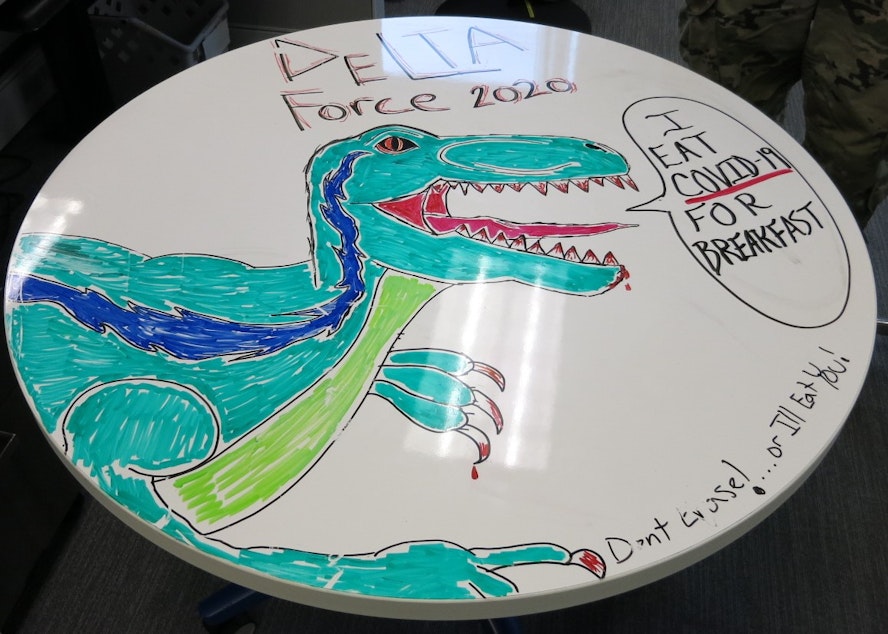Been close to Covid? You might get a call from this guy

We caught up with one of the hundreds of National Guard members trained to do contact tracing of Covid-19 cases in Washington state.
Meet the Delta team.
National Guard members in uniform who are a few weeks into their new job as contact tracers.
Amid a sea of cubicles and camo at an office building in Tumwater is private first class Dominic Gonzales.
These days, Gonzales calls people who tested positive for Covid-19 and their close contacts. He interviews them and advises them how to keep the virus from spreading, for example, by going into quarantine.
Before this gig, Gonzales worked construction: flagging, roadwork, and digging trenches, for example. But recently he got laid off.
Sponsored
Then Gonzales said he got a call from his platoon sergeant.
“Hey, we got this opportunity,” he recalled his sergeant saying. “Are you down?”
To ramp up contact tracing across Washington, the state had to figure out how to train a bunch of folks with no public health background – people like Gonzales.
That fell to Dr. Maayan Simckes at the Department of Health.
“Normally when you're developing training material or curriculum material, you have several weeks, if not months to do that work,” Simckes said. “We had a matter of days.”
Sponsored
The training goes over interview skills, confidentiality, and infectious disease concepts. Gonzales said he learned a lot.
“When I actually first came into this, I was one of those people with the train of thought of, yeah, we need to reopen everything, because, I mean, this doesn't seem like a big deal. And then after being educated, I 180-ed completely around.”
Staying home means you’re less likely to spread the virus, plus it makes contact tracing easier. The more people you let into your six-foot personal bubble, the more people a contact tracer would have to call if you got sick.
State Secretary of Health John Wiesman put it this way: “The first case in Washington State that we had, had 70 close contacts... If everybody had that, the amount of work that has to happen is enormous.”
First, being a contact tracer involves some detective work, asking long lists of specific questions about someone’s recent whereabouts and interactions, such as:
Sponsored
When did you first feel sick?
Did you spend at least one night in the hospital?
How many jobs do you have?
Since you got sick, did you live at, visit, work or go to a dialysis center, jail, place of worship…?
Have you been near anyone while you were sick?
Sponsored
Please provide as much information as you can about your contacts so that we can follow up with them.
We are unable to follow up with contacts with limited information (e.g. "guy with beard at Trader Joe's").

Gonzales says contact tracers help people think back using what they have on hand.
“Whether it be their phone calendar, possibly transactions and their credit card like, 'Oh, well, Tuesday, I usually get coffee. So it was right before I got coffee. So it's possibly Monday.'”
Sponsored
The job also involves a lot of people skills.
“If someone's mad, and they're mad, like, 'Why are you doing this blah, blah, blah.' I don't take offense to that. It's like, 'Okay, I'm putting myself in your shoes.'”
Creating a human connection is vital.
Gonzales says that came to him pretty naturally.
“I’m people person,” he said. “I get that from my dad. He’s a huge people person. But there’s always something to learn.”
These troops of contact tracers – along with other public health workers – are backing up counties around the state, including King County.
King County plans to be able to trace all its new cases locally by the end of June, rather than relying on help from the state.
Gonzales said he’s sees this new gig as doing his part.
“We have essential workers out there that are doing their part: nurses, truckers, all different ranges,” he said. “For me, this is what I can do to help with my part in this pandemic.”
The Trump Administration wants to pull National Guard soldiers off duty June 24th. Washington state is looking at bringing the guard under the state’s pay role to keep them at work, tracking the virus.




